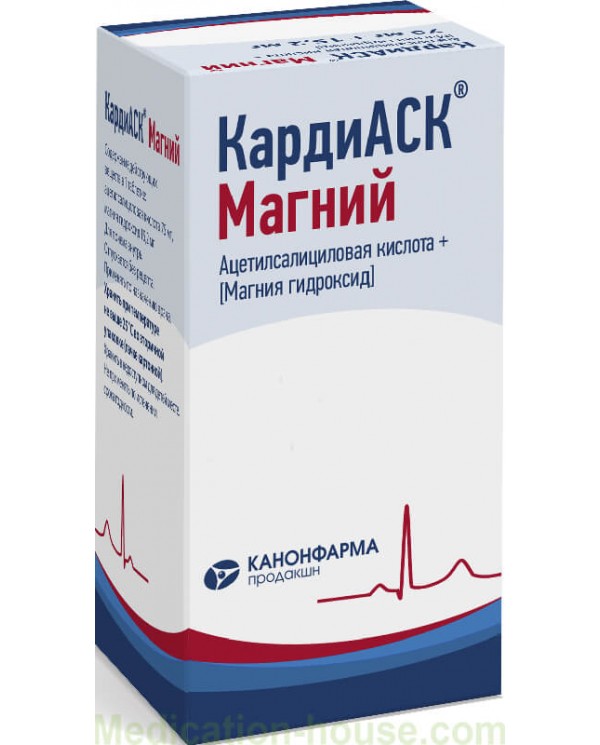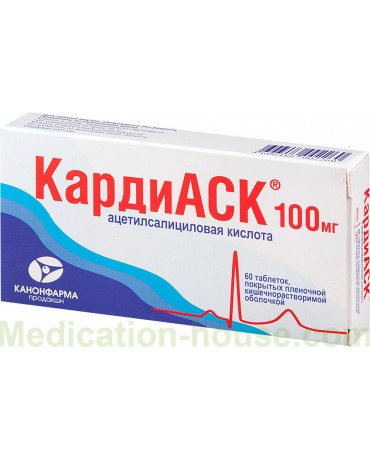CardiASK Magnesium instruction
You can buy CardiASK Magnesium here
Composition
Dosage 75 mg + 15.2 mg
1 film-coated tablet contains:
active ingredients: acetylsalicylic acid 75.00 mg, magnesium hydroxide 15.20 mg;
excipients: potato starch 1.90 mg, corn starch 8.60 mg, colloidal silicon dioxide 1.00 mg, magnesium stearate 0.30 mg, microcrystalline cellulose (type 101) 9.50 mg, microcrystalline cellulose (type 102) 3 , 50mg;
composition of the film shell: Opadray 20A28380 white 3.00 mg, including: hypromellose (hydroxypropyl methylcellulose) 1.0125 mg, hyprolose (hydroxypropyl cellulose) 1.0125 mg, talc 0.6000 mg, titanium dioxide 0.3750 mg.
Dosage 150 mg + 30.39 mg
1 film-coated tablet contains:
active ingredients: acetylsalicylic acid 150.00 mg, magnesium hydroxide 30.39 mg;
excipients: potato starch 3.80 mg, corn starch 17.20 mg, colloidal silicon dioxide 2.00 mg, magnesium stearate 0.61 mg, microcrystalline cellulose (type 101) 19.00 mg, microcrystalline cellulose (type 102) 7 .00 mg;
composition of the film shell: Opadray 20A28380 white 6.00 mg, including: hypromellose (hydroxypropyl methylcellulose) 2.0250 mg, hyprolose (hydroxypropyl cellulose) 2.0250 mg, talc 1.2000 mg, titanium dioxide 0.7500 mg.
Description
Dosage 75 mg + 15.2 mg: tablets are heart-shaped, scored on both sides, film-coated white or off-white. In cross section, the core is white or almost white. A slight odor of acetic acid is acceptable.
Dosage 150 mg + 30.39 mg: tablets are round, biconvex, film-coated, white or almost white. In cross section, the core is white or almost white. A slight odor of acetic acid is acceptable.
Pharmacodynamics
The mechanism of action of acetylsalicylic acid (ASA) is based on irreversible inhibition of cyclooxygenase (COX-1), as a result of which the synthesis of thromboxane A2 is blocked, and platelet aggregation is suppressed. It is believed that ASA has other mechanisms for suppressing platelet aggregation, which expands the scope of its application in various vascular diseases. ASA also has anti-inflammatory, analgesic, antipyretic effects.
Magnesium hydroxide, which is part of CardiASK Magnesium, protects the mucous membrane of the gastrointestinal tract from the effects of acetylsalicylic acid.
Pharmacokinetics
ASA is absorbed from the gastrointestinal tract almost completely. The half-life of ASA is about 15 minutes. with the participation of enzymes, ASA is rapidly hydrolyzed to salicylic acid (SA) in the intestine, liver and blood plasma. The half-life of SC is about 3 hours, but it can be significantly increased with the simultaneous administration of large doses of ASA (more than 3.0 g) as a result of saturation of the enzyme systems.
The bioavailability of ASA is about 70%, but this value fluctuates to a large extent, since ASA undergoes presystemic hydrolysis (gastrointestinal mucosa, liver) in the SC under the action of enzymes. The bioavailability of SC is 80-100%.
The doses of magnesium hydroxide used do not affect the bioavailability of acetylsalicylic acid.
Indications for use
Primary prevention of cardiovascular diseases, such as thrombosis and congestive heart failure, in the presence of risk factors (for example, diabetes mellitus, hyperlipidemia, arterial hypertension, obesity, smoking, old age).
Prevention of recurrent myocardial infarction and blood vessel thrombosis.
Prevention of thromboembolism after surgical interventions on the vessels (coronary artery bypass grafting, percutaneous transluminal coronary angioplasty).
Unstable angina.
Contraindications
Hypersensitivity to ASA, excipients of the drug, as well as to other non-steroidal anti-inflammatory drugs (NSAIDs); hemorrhage in the brain; tendency to bleeding (vitamin K deficiency, thrombocytopenia, hemorrhagic diathesis); bronchial asthma induced by the intake of salicylates and NSAIDs; erosive and ulcerative lesions of the gastrointestinal tract (in the acute phase); gastrointestinal bleeding; severe renal failure (creatinine clearance less than 10 ml / min); pregnancy (I and III trimesters); lactation period; deficiency of glucose-6-phosphate dehydrogenase; simultaneous reception with methotrexate (more than 15 mg per week); children under 18 years of age.
Carefully
With gout, hyperuricemia; in the presence of a history of ulcerative lesions of the gastrointestinal tract or gastrointestinal bleeding, renal and / or liver failure, bronchial asthma; hay fever; poly nose posture; allergic conditions; in the second trimester of pregnancy.
Application during pregnancy and during breastfeeding
The use of large doses of salicylates in the first 3 months of pregnancy is associated with an increased incidence of fetal defects. In the second trimester of pregnancy, salicylates can only be prescribed with a rigorous assessment of risk and benefit.
In the last trimester of pregnancy, salicylates in a high dose (more than 300 mg / day) cause inhibition of labor, premature closure of the ductus arteriosus in the fetus, increased bleeding in the mother and fetus, and administration just before childbirth can cause intracranial hemorrhage, especially in premature babies.
The appointment of salicylates in the last trimester of pregnancy is contraindicated.
The available clinical data are insufficient to establish the possibility or impossibility of using the drug during breastfeeding. Before prescribing acetylsalicylic acid during lactation, the potential benefit of drug therapy should be assessed in relation to the potential risk to infants.
Method of administration and dosage
The tablets are swallowed whole with water. If desired, the tablet can be broken in half, chewed or pre-ground.
Primary prevention of cardiovascular diseases such as thrombosis and congestive heart failure in the presence of risk factors (eg, diabetes mellitus, hyperlipidemia, hypertension, obesity, smoking, old age)
1 tablet of CardiASK Magnesium containing ASA at a dose of 150 mg on the first day, then 1 tablet of CardiASK Magnesium containing ASA at a dose of 75 mg once a day.
Prevention of recurrent myocardial infarction and blood vessel thrombosis
1 tablet of CardiASK Magnesium containing ASA at a dose of 75-150 mg once a day.
Prevention of thromboembolism after surgical interventions on the vessels (coronary artery bypass grafting, percutaneous transluminal coronary angioplasty)
1 tablet of CardiASK Magnesium containing ASA at a dose of 75-150 mg once a day.
Unstable angina
1 tablet of CardiASK Magnesium containing ASA at a dose of 75-150 mg 1 time per day.
Side effects of CardiASK Magnesium
The frequency of the adverse reactions listed below is indicated as follows: very often (≥1 / 10); often (> 1/100, <1/10); infrequently (> 1/1000, <1/100); rarely (> 1/10000, <1/1000); very rare (<1/10000), including isolated messages.
In each group, adverse reactions are presented in decreasing order of severity.
Allergic reactions
Often: urticaria, Quincke's edema.
From the immune system
Uncommon: anaphylactic reactions.
From the gastrointestinal tract
Very common: heartburn;
Often: nausea, vomiting;
Uncommon: pain in the abdomen, ulcers of the mucous membrane of the stomach and duodenum, gastrointestinal bleeding;
Rarely: perforated ulcers of the mucous membrane of the stomach and duodenum, increased activity of "liver" enzymes;
Very rare: stomatitis, esophagitis, erosive lesions of the upper gastrointestinal tract, strictures, if g, exacerbation of intestinal irritation.
From the respiratory system
Often: bronchospasm.
From the hematopoietic system
Very common: bleeding;
Rarely: anemia, hypoprothrombinemia, thrombocytopenia, neutropenia, aplastic anemia, eosinophilia, agranulocytosis.
From the central nervous system
Often: headache, insomnia;
Uncommon: dizziness, drowsiness;
Rarely: tinnitus, intracerebral hemorrhage.
Overdose
Overdose symptoms of moderate severity: nausea, vomiting, tinnitus, hearing impairment, dizziness, confusion.
Treatment: gastric lavage, intake of activated carbon; symptomatic therapy.
Overdose symptoms of a severe degree: fever, hyperventilation, ketoacidosis, respiratory alkalosis, coma, cardiovascular and respiratory failure, severe hypoglycemia.
Treatment: immediate hospitalization in specialized departments for emergency therapy - gastric lavage, determination of acid-base balance, alkaline and forced alkaline diuresis, hemodialysis, administration of solutions, intake of activated carbon, symptomatic therapy.
When carrying out alkaline diuresis, it is necessary to achieve pH values between 7.5 and 8. Forced alkaline diuresis should be carried out when the concentration of salicylates in plasma is more than 500 mg / L (3.6 mmol / L) in adults and 300 mg / L (2, 2 mmol / l) in children.
Interaction CardiASK Magnesium with other medicinal products
With the simultaneous use of ASA enhances the effect of the following drugs:
methotrexate by reducing renal clearance and displacing it from the connection with proteins;
heparin and indirect anticoagulants due to impaired platelet function and displacement of indirect anticoagulants from the connection with proteins;
thrombolytic and antiplatelet and anticoagulant drugs (ticlopidine);
digoxin due to a decrease in its renal excretion;
hypoglycemic agents for oral administration (sulfonylurea derivatives) and insulin due to the hypoglycemic properties of ASA itself in high doses and the displacement of sulfonylurea derivatives from the connection with blood plasma proteins;
valproic acid due to its displacement from the connection with proteins. The simultaneous use of ASA with ibuprofen leads to a decrease in the cardioprotective effects of ASA.
An additive effect is observed with the simultaneous intake of ASA with ethanol (alcohol). ASA weakens the action of uricosuric agents (benzbromarone) due to competitive tubular elimination of uric acid.
Enhancing the elimination of salicylates, systemic glucocorticosteroids (GCS) weaken their effect.
Antacids and cholestyramine reduce drug absorption.
Special instructions for CardiASK Magnesium
The drug should be used after a doctor's prescription.
ASA can provoke bronchospasm, as well as cause attacks of bronchial asthma and other hypersensitivity reactions. Risk factors are a history of bronchial asthma, hay fever, nasal polyposis, chronic respiratory diseases, and allergic reactions to other drugs (eg, skin reactions, itching, urticaria).
ASA can cause bleeding of varying degrees of severity during and after surgery. A few days before the planned surgical intervention, the risk of bleeding should be assessed in comparison with the risk of ischemic complications in patients taking low doses of ASA. If the risk of bleeding is significant, ASA should be temporarily discontinued. The combination of ASA with anticoagulants, thrombolytics and antiplatelet drugs is accompanied by an increased risk of bleeding.
ASA in low doses can provoke the development of gout in predisposed patients (with decreased excretion of uric acid).
The combination of ASA with methotrexate is accompanied by an increased incidence of side effects from the hematopoietic organs.
High doses of ASA have a hypoglycemic effect, which must be borne in mind when prescribing it to patients with diabetes mellitus receiving hypoglycemic agents for oral administration and insulin.
With the combined use of systemic glucocorticosteroids (GCS) and salicylates, it should be remembered that during treatment, the concentration of salicylates in the blood is reduced, and after the cancellation of systemic GCS, an overdose of salicylates is possible.
The combination of ASA with ibuprofen is not recommended in patients with an increased risk of cardiovascular diseases: with simultaneous use with ibuprofen, there is a decrease in the antiplatelet effect of ASA in doses up to 300 mg, which leads to a decrease in the cardioprotective effects of ASA.
Excessive doses of ASA over the recommended therapeutic doses are associated with the risk of gastrointestinal bleeding.
With prolonged use of low doses of ASA as an aggregate therapy, care must be taken in elderly patients due to the risk of gastrointestinal bleeding.
With the simultaneous administration of ASA with alcohol, the risk of damage to the mucous membrane of the gastrointestinal tract and prolongation of bleeding time is increased.
Influence on the ability to drive vehicles, mechanisms
During the period of treatment with ASA drugs, care must be taken when driving vehicles and engaging in potentially hazardous activities that require increased concentration of attention and speed of psychomotor reactions.
Release form
Film-coated tablets, 75 mg + 15.2 mg and 150 mg + 30.39 mg.
30 or 100 tablets in a polymer jar for medicines made of high density polyethylene with a polypropylene lid with silica gel, which provides protection against children, or in a polymer jar for medicines made of low pressure polyethylene with a tightened lid with first opening control with an attachment of silica gel, or in a jar made of polyethylene terephthalate with a lid made of polypropylene with an enclosure of silica gel, or in a brown glass bottle for packaging medical products with plastic lids with an enclosure of silica gel.
1 can of polymer for medicines or 1 bottle of brown glass, together with instructions for use, are placed in a carton box.
Storage conditions
At a temperature not higher than 25 ° C in secondary packaging (cardboard box).
Keep out of the reach of children.
Shelf life - 2 years.
Do not use after the expiration date.
Terms of sell
You don't need a prescription to buy CardiASK Magnesium.


